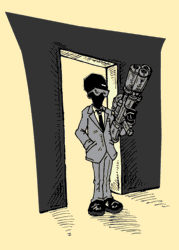 Anyone who has followed closely the many brutal armed conflicts in Africa over the past 20 years will have spent time wondering where the guns and ammunition used in the wars come from. Douglas Farah and Stephen Braun have helped to answer that question in their book Merchant of Death: Money, Guns, Planes and the Man Who Makes War Possible. The book tells the story of Viktor Bout, an entrepreneur who built an air transportation empire using superseded Russian aircraft following the demise of the USSR.
Anyone who has followed closely the many brutal armed conflicts in Africa over the past 20 years will have spent time wondering where the guns and ammunition used in the wars come from. Douglas Farah and Stephen Braun have helped to answer that question in their book Merchant of Death: Money, Guns, Planes and the Man Who Makes War Possible. The book tells the story of Viktor Bout, an entrepreneur who built an air transportation empire using superseded Russian aircraft following the demise of the USSR.
Bout’s business had a number of natural advantages. Large numbers of aircraft were available for very low prices. Numerous ex-military pilots were looking for employment and willing to take risks. This meant that Bout could provide transportation services to dangerous places at prices that undercut those offered by competitors. Consequently his services were frequently engaged to make deliveries to African war zones, and his apolitical “ask no questions” approach to business meant that he frequently ended up delivering arms to both sides in a conflict.
According to the authors, Bout has supplied arms to both sides in the Angolan civil war, as well as to Charles Taylor in Liberia, the RUF rebels in Sierra Leone, and various warring parties including the Rwandans in the Democratic Republic of Congo. He supplied arms to the Taliban and al Quaeda in Afghanistan, although he denies it, and in the wake of the US-led invasion of Iraq he supplied transportation services between Sharjah and Iraq for the US military and any other interested customers. If the job is difficult and dangerous and you want a good price, Viktor Bout is your man.
Bout is currently in prison in Thailand fighting extradition to the US on charges that he offered to supply weapons to FARC rebels in Columbia. The Russian government is fighting against the extradition, arguing that the charges are politically motivated. Bout’s story raises an interesting moral dilemma applicable to many people who run businesses: he seems to have conducted himself with “integrity” in his work for his clients, delivering on his promises in dangerous and difficult situations, but by turning a blind eye to what his clients were doing, he had a primary role in the slaughter of millions of people and condemning hundreds of millions to lives of poverty.
I found the book interesting and engaging throughout, and I would recommend it to anyone who wants to understand how wars in Africa are facilitated.